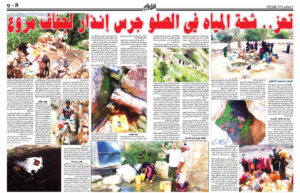Written by: Soria Bou Amer
Climate change is one of the most important challenges facing us today, and while global figures and scientific reports make headlines, the impact of this phenomenon on our daily lives remains a mystery to many. This is where journalists come in, transforming global knowledge about climate change into local stories that touch the lives of people everywhere.
Availability of the reports it issues Intergovernmental Panel on Climate Change (IPCC) A golden opportunity for journalists to access the latest scientific research on climate change, to understand the scientific basis of climate change, changes in the atmosphere and oceans, changes in weather and climate patterns, the effects of climate change on ecosystems and human systems and other topics.
This body was established in 1988 and consists of scientists and research institutions from all over the world. It surveys available climate change research and prepares periodic reports addressing the public in which it discusses the current state of our knowledge of climate change and its effects on various aspects of life.
The role of the journalist is highlighted in transforming scientific reports on climate change, which are difficult for the ordinary public to understand and be influenced by, into understandable stories relevant to the local community, to spread awareness about this phenomenon and its seriousness, highlight efforts to adapt and mitigate climate change at the local level, and inspire people to participate in Finding solutions to this global problem.
And in this the report Published by the Earth Journalism Network, there are a number of tips on how to benefit from the reports of the Intergovernmental Panel on Climate Change when we work on local climate stories, whether by summarizing and publishing the most prominent outputs of periodic and qualitative reports issued by the Panel, or by analyzing data and extracting stories from them, as well as benefiting from rich statistics. The reports provided support stories and give them a global perspective.
The most important of these tips provided by the report in this regard is the necessity for the journalist to have scientific knowledge in order to understand the various impacts resulting from climate change contained in the reports and be able to convey them to the public, and then work to edit the scientific results and outputs in a language that the public understands without harming science. The report advises using different angles to present the scientific reports issued by the Commission, linking the outputs to the stories of everyday people, places and wildlife, searching for solutions and explaining them to the public, and giving a local character to the reports we prepare because they are what primarily concern our audience.
Through IPCC reports, journalists can extract local stories that touch the reality of people in their communities, for example the story of a farmer in a remote area who is facing difficulties in growing his crops due to changing weather patterns, or the story of fishermen on the sea coast who are suffering from declining fish populations. Due to rising water temperatures, or residents of a coastal city are at risk of drowning due to rising sea levels.
You can access the various reports of the Intergovernmental Panel on Climate Change and learn more about the roles it plays and the reports it issues through its official website. There is an Arabic version of the website that can be accessed from here. Link.





